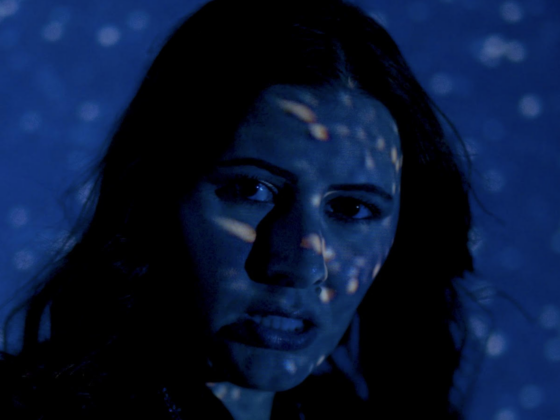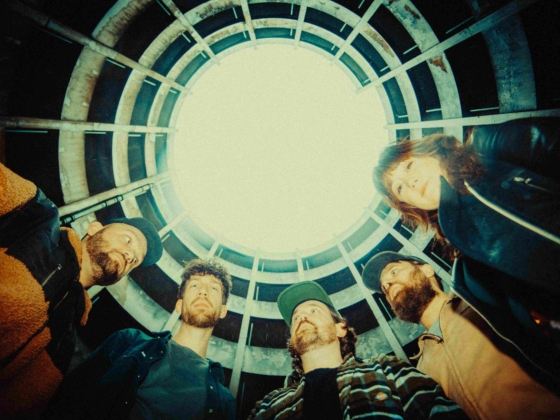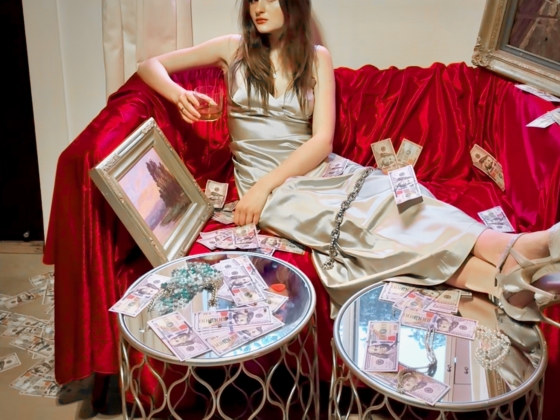Last December we premiered Innershades' cut, "Gravure", that triggered our attention with its saucy melodies and retrograded drift that's quickly becoming a trademark for the Belgian producer. Coming up during a time when house music constantly resounds and recycles itself as a sub-hybrid of another, Thomas Blanckaert chooses to turn back a few pages and refurbish a dance tradition that began in Chicago and is now finding its way back through the rearward streets of Aalst, Belgium. With tasteful releases fittingly finding a home via labels like Creme Organization, Wicked Bass, and now Parisian imprint – Skylax, Blanckaert keeps a streak of Dance Mania inspired tracks moving with a newfangled marginal warp of present day off-mainstream club music.
Toxic Trax follows up his last efforts gracefully, showcasing six tracks that mire and carbon the sovereign sounds of house music's inception within a 30 minute affair. The muffled and vaulty nature instantly transports our nostalgia to a blockhouse setting with the aptitude to make us believe this couldn't be made any later than '93. Blanckaert captures the sooty and unclad essence of house music that meant to do one thing only: make you groove.
Allowing us to choose our favorite batch of tracks from the EP, you can officially listen to three exclusive streams off of Toxic Trax (set as a [VINYL-ONLY] release). Along with that, we also caught up with Blanckaert himself. Check out what he had to say about his machines, favorite records, and future plans.
Pre-Order Toxic Trax HERE
Quinten Decleyn Photograpy
EARMILK: You are one of Belgium’s newer faces within the techno/ house scene. Right from your debut That Girl EP you already had esteemed producers like Locked Groove and Vakula remixing. How did that come about?
INNERSHADES: Well, I made that track over two years ago now. I remember finishing it one night and I sent it to Locked Groove the next day for some feedback. He was really into it so that's when I started to think I was on to something with this track. A week later I went ahead and sent it to Nazar [Prokopiv] from Wicked Bass; he loved it and signed it immediately.
It was a good follow up for that Parris Mitchell re-issue he had just released and it fit the sound he wanted to push for. Of course, I had to ask Locked Groove to remix the track myself while Nazar fixed Vakula for a second remix that, obviously, I could not refuse :).
EM:What is the idea behind your respective label Roze Balletten? How are you figuring out which releases go to this label?
IS:I came up with the idea to start my own label with two friends of mine who also Dj and produce, Raw Sketches and NYUU. The name is based on a Belgian case that happened in the 80's that involved a lot of big shots and politicians over here. It's a great story and concept to make something out of because we can work with plenty of material for the artwork and so forth.
We just want to sign good music but we are trying to focus on Belgian producer/friends who we like and also have lots of talent that we think needs to be shown to the rest of the world. The first release is just the way we wanted and pictured it to be: Three tracks by Belgian artists – Locked Groove, Raw Sketches, and myself. If all goes as planned, it will be a full sleeve EP with stickers and some other stuff included, otherwise it will just include some stickers. I cannot really say anything more about future releases, but we have already signed some pretty good stuff by other artists and friends ;). Anyway we will drop a few EP's in 2014 that hopefully people will like.
EM: You often note Dance Mania as a significant impact in your music, what is it about this specific sound that keeps you locked?
IS: I admire the rawness and simplicity in those tracks. I think it shows how "less is more" can sometimes be better than putting too much into your track. Just let the few elements do their thing and in most cases the track will work much better than when there is just a whole lot going on. It also shows that the idea is more important than the mixdowns, I think. Of course, not all the stuff they released is simple and stripped down like that, but that is mainly why I think it's had an impact on how I make my music these days. It's just simple, stripped down tracks with a few elements that keep everything going.
EM:You do a great job at capturing the spirit of 80's Chicago , are you using any particular hardware to help you accomplish that?
IS: I use everything I can get my hands on. Basically, I use a mix of hardware and software to get the sound I want. At the moment I am using the Korg Electribe a lot right now along with this little new synth who became a good friend of mine; the Korg Volca Bass. Neville Watson got me hooked on that little thing.
EM:If you were forced to only use one machine for the rest of your musical career which one would it be? Why?
IS: That's a hard one, I have no clue because I really don't have any favorites, but maybe if I had to choose it would be the Korg Electribe MX because it has everything I need: drums, effect & synths. I can easily make a good loop or track with that thing quite fast.
EM: What other kinds of music releases do you often pull from your record shelves that we might not be aware of?
IS: I do listen to plenty of underground hip-hop from the 2000's era and earlier. I like lots of Madlib, MF DOOM, J. Dilla, Looptroop, Mr Lif, The Molemen, Cannibal Ox, MED,Opgezwolle (NL), … all those classic hip hop albums from that era. Also, I'm really into Italo Disco as well. I really love the cheesyness and bad vocals on most records: Pineapples – Come On Closer is actually one of my favorite records ever.












